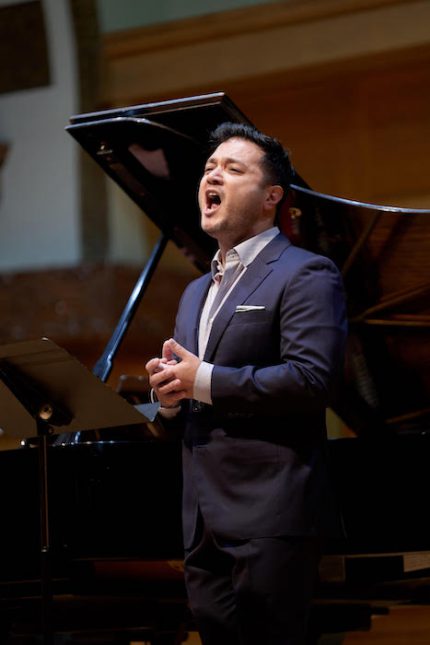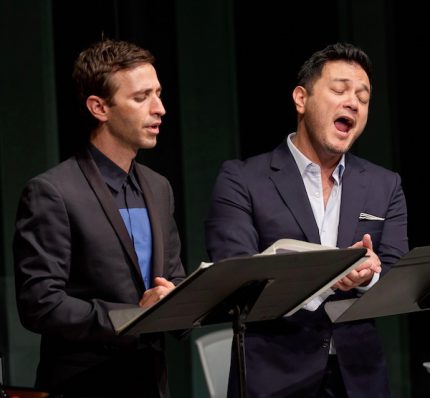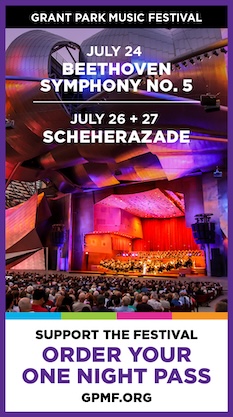Collaborative Works Fest showcases wide range of American song

The Collaborative Arts Institute of Chicago’s Collaborative Works Festival continued its exploration of living composers Saturday night with another thoughtfully conceived program delivered with supreme artistry.
Following up Thursday’s survey of Chicago composers, the second of the festival’s three programs, titled “The Nation,” focused more broadly on American composers in the intimate quarters of the Poetry Foundation on the city’s near north side.
Leading off the program was “In the Arc of your Mallet” from Philip Glass’s 1997 opera Monster of Grace (with libretto from thirteenth-century Sufi mystic Rumi). The song has become something of a calling card for countertenor Anthony Roth Costanzo, whose clarion tone and magnificently sculpted phrases in this performance undercut the subtle sensuality of the text with a welcome sense of urgency.
One of the evening’s highlights came early in the program with the Midwest premiere of Gabriela Lena Frank’s Iberian Songs. Frank, a California native of mixed Peruvian/Chinese and Lithuanian/Jewish descent, crafts striking pieces that often mine her rich cultural heritage. Iberian Songs is one such work, whose texts are formed from a handful of anonymous Spanish poems assembled into a diptych of songs about unrequited love and family bloodshed.
Soprano Lauren Snouffer brought emotional and sonic heft to the declamations of longing in the first setting, “Olivos.” Both in her supple vocal gestures and expressive melismata, Snouffer sang with subtlety and pureness of tone that underscored the text’s drama without ever becoming overwrought.
Supporting Snouffer was a string quartet comprising Chicago Symphony musicians (violinist Yuan-Qing Yu, violist Weijing Wang, and cellist Kenneth Olsen) and Lyric Opera Orchestra violinist Kathleen Brauer. The string players displayed their pedigree in a fine delivery of the piece’s Bartókian accompaniment, especially in the twisted dance of the second song, “Hijos.” Only occasionally in the piece’s most rousing tutti moments did the ensemble overwhelm Snouffer’s otherwise well-balanced soprano.
Though excellent throughout, Costanzo emerged as the star of the evening in “Countertenor’s Conundrum” and “The Trouble with Trebles in Trousers” from Jake Heggie’s Encountertenor. The plainspoken, often cheeky songs from Encountertenor border on showtune territory in their lyric wit and musical literalism. A less adroit interpreter might risk driving them toward tackiness; Costanzo, however, aided by plucky accompaniment from pianist John Arida, brought sincerity, warmth, and no small dose of acerbic humor to these songs, making an argument for a place in the repertoire for Heggie’s light cycle.
When it came to dramatic content, Snouffer bore the night’s heaviest emotional and psychological burden. As in Iberian Songs, some heavy lifting was required in Ned Rorem’s song cycle Ariel, set to poems from Sylvia Plath’s posthumously published collection of the same name.
Snouffer handled each song’s technical demands with panache, demonstrating astonishing control in the piece’s angular leaps and belted high notes. Perhaps she could have brought a bit more tenderness to the contrasting moods of the cycle, such as in the aching “Poppies in October.” Still, Snouffer delivered the most caustic stanzas with fire and crystal-clear diction – particularly in the closing bombshell “Lady Lazarus.” Credit is due to clarinetist Samuel Almaguer, who delivered his sweeping lines with flair opposite Snouffer’s vocal acrobatics.

CAIC artistic director Nicholas Phan took the stage in the second half of the intermission-less program with a pair of songs by Sarah Kirkland Snider. The tenor captured the room with a haunting a cappella setting of William Blake’s “Mad Song.” Violinist Yu and cellist Olsen traced gauzy lines around Phan’s plaintive, austere vocalism in “Chrysalis,” in which the speaker—in a dream—encounters an unwritten poem in the form of a woman. The results were mesmerizing.
The ultimate high point of the evening was Nico Muhly’s Lorne Ys My Likinge, a setting of the nineteenth Chester Mystery Play. These fifteenth-century English dramatic portrayals of Biblical scenes also provided fodder for composer Benjamin Britten; his Canticle II on the story of Abraham and Isaac features the unusual pairing of tenor and countertenor in the vocal roles, as does this 2015 setting from Muhly.
Lorne Ys My Likinge imagines a vignette of Mary Magdalene, Mary Jacobi, and Mary Salome at Jesus’s empty tomb, where they are visited by a host of angels. There was no pageantry in the delivery of this setting, however; all the drama was embedded in the music. Costanzo and Phan were a marvelous match, delivering arcing duet lines with sterling intonation as the scene’s Angels; the two were at their best while singing in unison, melding into a pure, homogenous vocal sound. The ever-sturdy pianist Lisa Kaplan provided sensitive support throughout.
The string quartet returned a final time with Costanzo in Caroline Shaw’s “And So,” heard here in its Midwest premiere. The song’s text is from the composer, (“after Robert Burns, Gertrude Stein, Billy Joel and Shakespeare,” says Shaw in her note) and reads like an ode to songcraft itself: “a rose is a rose is a rose… is a tired rhyme / but in the verse there’s always time.” Shaw’s wry closer proved apt for the venue and made a poetic sendoff to the evening.
The Collaborative Works Festival closes with “The World” 2 p.m. Sunday at the Logan Center for the Arts Performance Penthouse, 915 E. 60th. The program includes works by Kaija Saariaho, Jonathan Dove, Nicolas Bacri and Errollyn Wallen. caichicago.org
Posted in Performances
